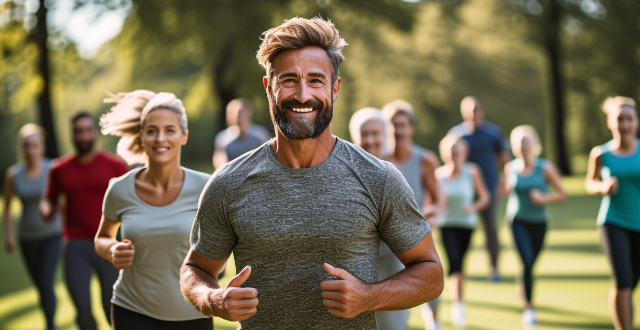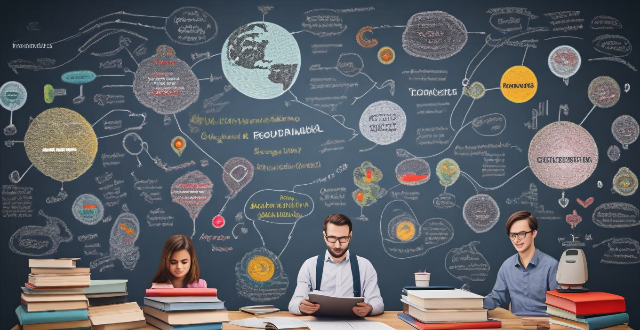Individual Motivation

Can team sports contribute to mental rejuvenation more than individual sports ?
Team sports may contribute more to mental rejuvenation than individual sports due to increased social interaction, motivation, and sense of belonging. However, individual preferences vary, and some people may find greater mental rejuvenation through individual sports or other activities that bring them joy and fulfillment.

What role does intrinsic motivation play in learning and how can I cultivate it ?
Intrinsic motivation is a key factor in enhancing the learning process. It leads to increased engagement, persistence, and deeper understanding of material. To foster this type of motivation, one should focus on promoting autonomy, competence, relatedness, personal interest, and a mastery orientation. Strategies include offering choices, providing clear feedback, building community, connecting to interests, and emphasizing the learning journey over just the outcome.

How can I increase my motivation to study ?
Motivation is crucial for success in education, but staying motivated can be challenging. To increase your motivation to study, set clear goals, create a study plan, find a study group or partner, stay positive, and reward yourself for meeting goals.

What role does motivation play in educational psychology ?
Motivation is crucial in educational psychology as it influences student engagement and academic performance. It can be intrinsic or extrinsic, with students driven by internal factors like curiosity or external factors like rewards. Understanding theories such as goal orientation and self-determination can help educators foster motivation through strategies like setting clear goals and providing autonomy. Ultimately, creating effective learning environments that inspire students requires a deep understanding of motivation and its impact on education.

What is the relationship between self-efficacy and motivation in learning ?
This article explores the relationship between self-efficacy and motivation in learning. It explains how self-efficacy affects motivation, including choice of activities, level of effort and persistence, and emotional response to setbacks. The article also provides suggestions for enhancing self-efficacy to increase motivation, such as providing opportunities for mastery experiences, modeling successful performance, offering positive feedback and encouragement, and helping students set realistic goals.

Is there a difference in mental health benefits between individual and group exercises ?
Exercise plays a vital role in maintaining good mental health, with both individual and group exercises offering unique benefits. Individual exercises provide flexibility, focus, and personal challenge, while group exercises offer social support, motivation, and accountability. Both types of exercise have been shown to reduce stress, anxiety, and depression while improving mood, self-esteem, and cognitive function. Ultimately, finding an activity that you enjoy and can consistently incorporate into your lifestyle is key to maintaining good mental health through exercise.

What factors contribute to a decrease in motivation to learn and how can they be addressed ?
Motivation to learn can be affected by a variety of factors, including lack of interest or passion, external pressures, emotional state, physical condition, teaching methods, and expectations/feedback. To counteract these influences, strategies such as cultivating interest, managing stress, supporting emotional well-being, addressing physical needs, enhancing teaching techniques, and setting realistic goals are recommended. By understanding and proactively addressing these factors, both educators and learners can work together to enhance motivation, leading to more productive and satisfying learning experiences.

How do individual versus team sports impact self-esteem in young people ?
The text discusses the impact of individual versus team sports on self-esteem in young people. It outlines key points such as the focus on personal growth and discipline in individual sports, and the social support and collaboration learned in team sports. The benefits of each type of sport are also highlighted, including increased autonomy and clear feedback from individual sports, and social skills development and resilience from team sports. A comparative analysis is provided, discussing the pros and cons of each type of sport in relation to self-esteem. The conclusion suggests that both types of sports can positively impact self-esteem, but finding the right fit for each individual is crucial.

How does team sports impact mental health compared to individual sports ?
This article explores how team sports impact mental health compared to individual sports. It highlights the social support and belongingness provided by team sports, which can reduce feelings of isolation and loneliness. The article also discusses how team sports promote accountability and responsibility, helping individuals develop discipline and self-control. Additionally, it emphasizes the importance of goal setting and achievement in team sports, which can boost self-esteem and confidence. Overall, the article concludes that team sports have a significant impact on mental health compared to individual sports due to their social aspect.

How does music influence motivation during physical activity ?
Music has a significant impact on motivation during physical activity. Fast-paced music increases energy levels, slow-paced music promotes relaxation, and enjoyable music enhances mood. Music can also distract from pain and fatigue, and personal preference plays a role in its effectiveness. Incorporating music into workout routines can make exercise more enjoyable and lead to better results.

How can parents encourage and support their children's academic motivation ?
Academic motivation is a crucial factor in a child's educational journey. Here are some tips on how parents can encourage and support their children's academic motivation: 1. Set goals and expectations by discussing interests and strengths, creating a plan, and providing regular feedback. 2. Create a conducive learning environment by providing a quiet study space, minimizing distractions, and encouraging breaks and physical activity. 3. Offer encouragement and praise by acknowledging efforts and achievements, praising hard work and dedication, and celebrating successes. 4. Be involved in their education by attending parent-teacher conferences, showing interest in their studies, and helping with homework when needed. 5. Model good study habits by demonstrating a positive attitude towards learning, practicing time management and organization skills, and showing perseverance and resilience when faced with challenges.

What are the benefits of setting goals for studying and how do they impact motivation ?
The benefits of setting goals for studying include increased clarity and direction, improved motivation through short-term milestones and visual progress tracking, better time management with efficient planning and reduced procrastination, enhanced performance via targeted learning and a feedback loop, and stress reduction due to predictability and a sense of control. These advantages collectively contribute to heightened motivation, both immediately and in the long term, making goal setting an essential strategy for effective and enjoyable learning.

How do individual versus team sports differ in their impact on child development ?
Individual sports foster self-reliance and technical mastery, while team sports emphasize social skills and emotional intelligence. Both have unique benefits for child development, and the choice should consider the child's personality and desired skill development. A combination of both might provide the most well-rounded experience.

What role does gamification play in improving student motivation and learning outcomes ?
Gamification is a growing trend in education that involves incorporating game-like elements into learning activities. It aims to increase student motivation and engagement, leading to improved learning outcomes. Gamification can enhance student motivation by providing rewards and recognition, immediate feedback, and a fun and engaging experience. It can also improve learning outcomes by enhancing cognitive skills, increasing retention and recall, and promoting collaborative learning. To effectively implement gamification in education, educators should consider clear objectives, adaptive challenge levels, balanced competition and collaboration, regular updates, and integration with other teaching methods.

How can teachers help students improve their motivation to learn ?
Teachers can boost student motivation by setting clear goals, creating a positive learning environment, making lessons relevant, providing autonomy, offering support, using varied teaching methods, modeling passion for learning, and addressing barriers to learning.

What benefits can individual athletes gain from tracking and analyzing their performance data ?
Individual athletes can gain numerous benefits from tracking and analyzing their performance data, including improved performance, increased motivation, greater self-awareness, better injury prevention, and more effective recovery strategies. By monitoring their progress, identifying areas for improvement, and making data-driven decisions about their training and competition strategies, athletes can enhance their overall performance and achieve better results.

How can team sports help in individual skill development ?
Team sports contribute significantly to individual skill development by improving communication skills, enhancing leadership abilities, increasing self-confidence, bettering time management, improving social skills, promoting physical fitness and coordination, providing opportunities to learn from mistakes, and fostering adaptability.

Why do people procrastinate and how can they stop ?
Procrastination is a common behavior influenced by factors like lack of motivation, fear of failure or success, difficulty with self-regulation, and environmental distractions. To overcome procrastination, individuals can set clear goals, improve time management, boost motivation, address emotional barriers, and develop self-regulation skills. Consistent implementation of these strategies can lead to increased productivity and reduced procrastination over time.

How do the principles of sports biomechanics differ between individual and team sports ?
This text discusses the principles of sports biomechanics in individual and team sports. It highlights the differences in kinematics, kinetics, and coordination between the two types of sports. In individual sports, there is a focus on precision, technique optimization, and personal performance, while team sports emphasize strategic interactions, group coordination, and adaptability to complex game situations. The text concludes by emphasizing the importance of understanding these distinctions for coaches and athletes to tailor their training approaches to best suit the specific demands of their chosen sport.

What role does visualization play in sports performance ?
Visualization is a powerful tool that can enhance sports performance by improving focus, confidence, technique, recovery, and motivation. It involves creating mental images of desired outcomes or actions, which can lead to better concentration, increased self-efficacy, enhanced motor learning, reduced risk of injuries, and higher levels of motivation. By incorporating visualization into their training routines, athletes can strengthen their physical and mental capabilities, resulting in improved performance during competition and training.

Can listening to music help or hinder concentration ?
Listening to music can both help and hinder concentration, depending on factors such as the type of music, individual preferences, and the task at hand. Positive effects include increased motivation, improved mood, reduced stress, and enhanced creativity. Negative effects may include distractions, cognitive overload, emotional responses, and individual differences in musical preferences. To optimize the use of music while working or studying, consider choosing the right genre, adjusting volume, taking breaks, personalizing playlists, and experimenting with different types of music.

How can sport psychology counseling help athletes improve their performance ?
Sport psychology counseling is a specialized field that focuses on the mental and emotional aspects of athletic performance. It aims to enhance an athlete's mindset, motivation, and overall well-being to improve their sporting outcomes. Here's how it can be beneficial: Goal Setting and Motivation: Sport psychologists help athletes set Specific, Measurable, Achievable, Relevant, and Time-bound goals. This clarity in objectives boosts motivation and directs efforts toward improvement. Confidence and Self-Esteem Building: Coaching athletes to replace negative self-talk with positive affirmations enhances their confidence and self-belief. Anxiety and Stress Management: Techniques like deep breathing, progressive muscle relaxation, and mindfulness can reduce anxiety levels before and during competitions. Focus and Concentration: Improving an athlete's ability to focus on relevant cues and block out distractions is crucial for peak performance. Team Dynamics and Interpersonal Skills: Enhancing communication within teams fosters better cooperation and understanding among athletes. Mental Toughness and Resilience: By preparing mentally for setbacks, athletes learn resilience and are better equipped to handle difficulties when they arise. Recovery and Balance: Adequate rest is essential for physical recovery and maintaining mental sharpness. Sport psychologists can guide effective strategies. Helping athletes achieve a balance between their sport and personal lives prevents burnout and keeps them motivated.

Can anyone learn a new language quickly, or does it depend on individual ability ?
Learning a new language is influenced by cognitive, social, and emotional factors. Intelligence, memory, attention, motivation, practice opportunities, and a supportive environment all play a role in language acquisition. Emotional factors such as anxiety and self-confidence can also impact learning. However, anyone can improve their language skills through strategies like setting clear goals, consistent practice, and using multiple learning styles.

What are some effective strategies for improving study habits and motivation ?
Effective strategies for improving study habits and motivation include setting clear goals, creating a study plan, eliminating distractions, using active learning techniques, staying motivated, seeking help when needed, and practicing self-care. These strategies can lead to academic success.

What are the benefits of having a strong sports mentality ?
A strong sports mentality can bring numerous benefits to an individual, both on and off the field. A sports mentality refers to a set of psychological traits and attitudes that enable athletes to perform at their best under pressure, maintain focus, and overcome challenges. Having a strong sports mentality can significantly improve an athlete's performance by enhancing their ability to concentrate, make quick decisions, and execute skills effectively. This mental toughness allows them to stay calm under pressure and maintain a positive mindset even when facing adversity. As a result, they are more likely to achieve success in their chosen sport. Athletes with a strong sports mentality tend to be more resilient in the face of setbacks and failures. They view these challenges as opportunities for growth and learning rather than obstacles that prevent them from achieving their goals. This resilience helps them bounce back from disappointments and continue working towards their objectives. A strong sports mentality also provides athletes with effective coping mechanisms for dealing with stress and anxiety. These strategies may include visualization techniques, deep breathing exercises, or positive self-talk. By employing these methods, athletes can manage their emotions and maintain a level head during high-pressure situations. Individuals with a strong sports mentality are often highly motivated and driven to succeed. They possess a strong desire to improve and push themselves to reach new heights. This intrinsic motivation can lead to increased effort and dedication, which ultimately translates into better results. A sports mentality fosters teamwork and collaboration among athletes. It encourages individuals to work together towards a common goal, support each other through challenges, and celebrate collective achievements. This sense of camaraderie not only improves performance but also creates lasting bonds between teammates. Finally, having a strong sports mentality promotes personal growth and development. Athletes learn valuable life skills such as discipline, perseverance, time management, and goal setting. These skills are transferable to other areas of life, helping individuals become well-rounded individuals who are capable of achieving success in various endeavors.

How can I overcome procrastination and lack of motivation when it comes to studying ?
Overcoming procrastination and lack of motivation in studying requires discipline, planning, and self-awareness. By setting clear goals, creating a study plan, eliminating distractions, taking breaks, and rewarding yourself, you can improve your productivity and focus while studying. Remember to be patient with yourself and celebrate small successes along the way. With consistent effort and dedication, you can overcome these challenges and achieve your academic goals.

What is the impact of sports psychology on an athlete's overall well-being ?
Sports psychology plays a crucial role in enhancing an athlete's overall well-being by addressing various aspects such as mental preparation, motivation, confidence building, stress management, and injury recovery. Mental preparation includes goal setting, visualization, and task focus; motivation involves intrinsic motivation, goal setting, and self-talk; confidence building entails developing a positive mindset, celebrating successes, and learning from mistakes; stress management includes breathing exercises, mindfulness practices, and time management; and injury recovery provides emotional support, coping strategies, and return-to-play planning. By addressing these aspects, sports psychology helps athletes perform at their best while maintaining their mental and physical health.

How does music affect athletic performance ?
Text is about how music can affect athletic performance. It explains the ways in which listening to music while exercising or competing can increase motivation, improve focus, reduce the perception of effort, and distract from pain and fatigue, leading to better performance and results.

How does a strong emphasis on athletics affect student performance in other subjects ?
The text discusses the various ways in which a strong emphasis on athletics can influence academic achievements, considering factors such as time allocation, mental health, motivation, and social dynamics. While it can present challenges such as reduced study time and increased stress, it also offers benefits like improved time management and enhanced motivation. Schools and educators should strive to create a balanced environment where both athletics and academics are supported, ensuring that students can excel in all aspects of their education.